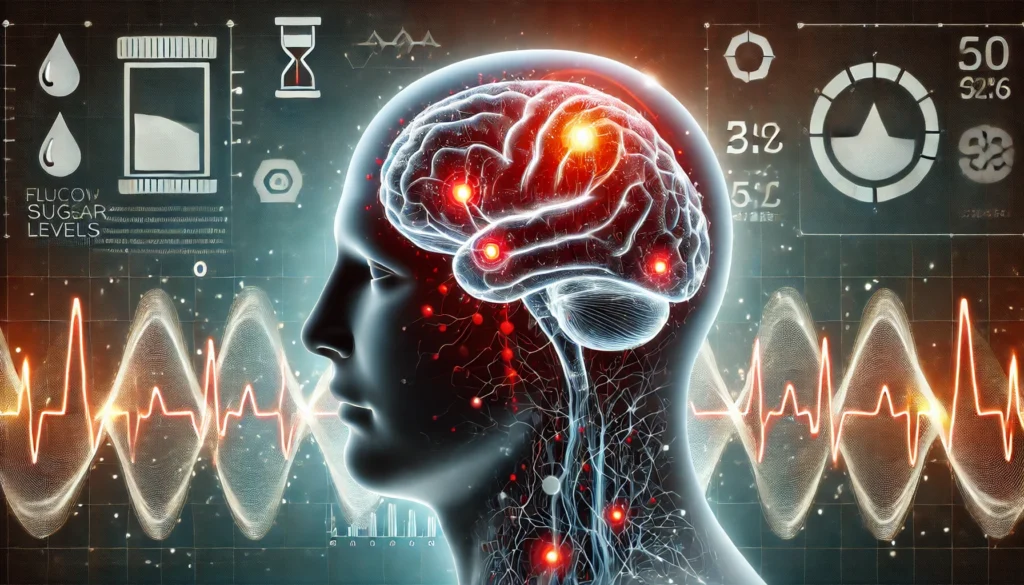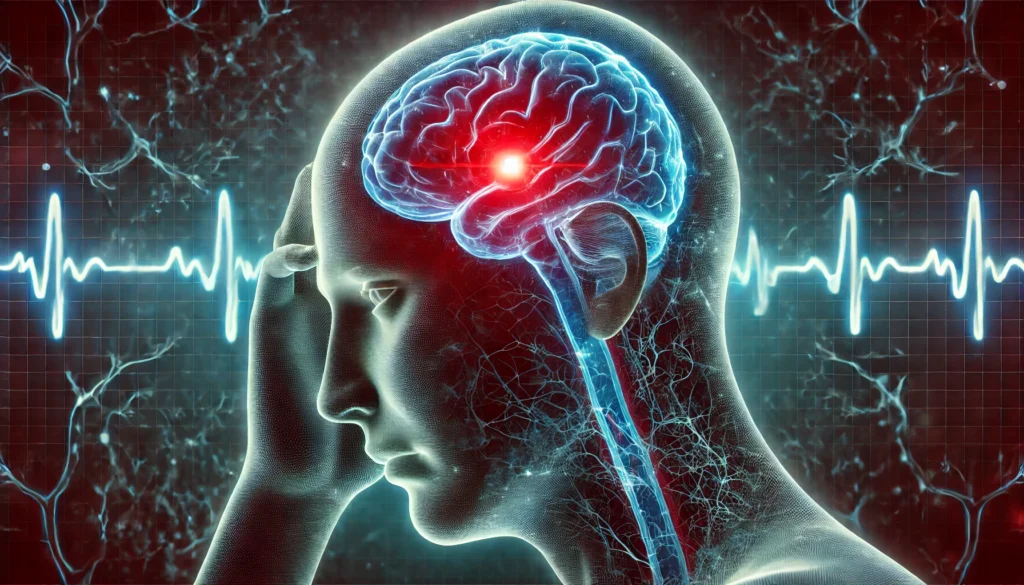Understanding the Relationship Between Low Blood Sugar and Headaches
Understanding the relationship between blood sugar levels and headaches is essential for those who experience sudden head pain without an apparent cause. While many people associate headaches with stress, dehydration, or lack of sleep, fluctuations in blood sugar levels can also be a significant factor. Hypoglycemia, commonly referred to as low blood sugar, occurs when the body’s glucose levels drop below the normal range, leading to a range of physiological responses, including headaches. These headaches, often described as dull, throbbing, or tension-like, can disrupt daily activities and overall well-being. Exploring the connection between low blood sugar and headaches can help individuals identify potential triggers and adopt strategies for prevention and management.
You may also like: How Diabetes Affects the Brain: Understanding Brain Fog, Memory Loss, and Mental Confusion from High Blood Sugar
The Physiological Mechanisms Behind Hypoglycemia-Induced Headaches
The physiological mechanisms linking hypoglycemia to headaches are complex and involve multiple bodily systems. When blood sugar levels drop too low, the brain, which relies heavily on glucose for energy, begins to experience dysfunction. The body responds by releasing stress hormones such as adrenaline and cortisol, which can lead to blood vessel constriction, inflammation, and increased sensitivity to pain. Additionally, the nervous system may react by triggering migraine-like symptoms, making it difficult to distinguish a hypoglycemia headache from other headache types. By understanding the underlying biological processes, individuals can take proactive measures to stabilize their blood sugar levels and reduce headache frequency.

Recognizing the Symptoms of a Hypoglycemia Headache
Recognizing the symptoms of a hypoglycemia headache is crucial for timely intervention. Symptoms often develop gradually and may include dizziness, irritability, sweating, weakness, and a feeling of confusion or disorientation. Some people may experience nausea or blurred vision alongside their headaches. In severe cases, if blood sugar levels continue to drop unchecked, more serious neurological symptoms such as seizures or loss of consciousness may occur. Early detection and treatment can prevent such extreme outcomes and help individuals manage their condition effectively. Learning to identify the early warning signs of low blood sugar headaches can empower individuals to make necessary dietary and lifestyle changes to maintain stable glucose levels.
Factors That Contribute to Low Blood Sugar Headaches
Several factors can contribute to the onset of hypoglycemia headaches. Skipping meals, excessive physical activity without proper fuel, and consuming too many simple carbohydrates can all lead to rapid blood sugar fluctuations. People with diabetes who take insulin or certain oral medications are particularly at risk for experiencing low blood sugar headaches, especially if they miscalculate their medication dosage or fail to eat adequately. Additionally, alcohol consumption and prolonged fasting can also lower blood sugar levels and contribute to headache development. Identifying personal triggers and patterns in blood sugar fluctuations can help individuals take preventive measures to avoid headaches related to hypoglycemia.
Dietary Strategies for Preventing Hypoglycemia Headaches
Diet plays a pivotal role in preventing low blood sugar headaches. Consuming balanced meals that include a mix of complex carbohydrates, protein, and healthy fats can help stabilize blood sugar levels throughout the day. Avoiding excessive sugar intake, which can cause rapid spikes and crashes in glucose levels, is also crucial. Eating at regular intervals, rather than going long periods without food, can prevent blood sugar from dropping too low. Individuals prone to hypoglycemia should carry snacks such as nuts, yogurt, or whole grains to quickly address blood sugar dips before they trigger a headache. Making mindful food choices can significantly reduce the occurrence of hypoglycemia-induced headaches and improve overall health.
When to Seek Medical Advice for Low Blood Sugar Headaches
For those who frequently experience low blood sugar headaches, medical consultation is advised. A healthcare provider can assess whether underlying health conditions, such as diabetes or hormonal imbalances, are contributing to blood sugar instability. Blood tests and glucose monitoring may be recommended to track patterns and provide a clearer picture of an individual’s blood sugar regulation. In some cases, adjusting medication, implementing a more structured eating plan, or incorporating lifestyle modifications may be necessary. Personalized medical advice can help individuals effectively manage their blood sugar levels and minimize the frequency and severity of headaches.
The Role of Exercise in Blood Sugar Management and Headache Prevention
Exercise and physical activity also influence blood sugar levels and can play a role in headache prevention. While regular exercise offers numerous health benefits, including improved insulin sensitivity and metabolic function, overexertion without proper nutrition can lead to hypoglycemia. Those prone to low blood sugar headaches should ensure they consume adequate nutrition before and after exercise to maintain stable glucose levels. Staying hydrated and choosing appropriate workout intensity can also help prevent blood sugar fluctuations that might trigger headaches. A well-balanced approach to physical activity can support overall health while reducing the risk of hypoglycemia-related symptoms.
Managing Stress to Prevent Hypoglycemia Headaches
Managing stress is another crucial component of preventing low blood sugar headaches. Chronic stress can interfere with blood sugar regulation by increasing cortisol levels, which can lead to erratic glucose fluctuations. Practicing stress management techniques such as mindfulness, deep breathing, meditation, and adequate sleep can contribute to more stable blood sugar levels. Additionally, incorporating relaxation practices into daily routines can reduce the likelihood of developing stress-induced hypoglycemia headaches. Taking a proactive approach to stress management can improve both blood sugar stability and overall well-being.
Hydration and Its Impact on Blood Sugar Stability and Headaches
Hydration plays a key role in preventing headaches, including those caused by low blood sugar. Dehydration can exacerbate the symptoms of hypoglycemia, making headaches feel more severe. Drinking sufficient water throughout the day can help maintain overall hydration levels and support stable blood sugar regulation. For those experiencing frequent headaches, monitoring fluid intake and ensuring they are consuming enough electrolytes, particularly during physical activity, can make a significant difference. Proper hydration is a simple yet effective way to prevent headaches and maintain optimal bodily function.
The Connection Between Sleep and Blood Sugar Fluctuations
Sleep quality also affects blood sugar levels and headache frequency. Poor sleep can lead to insulin resistance, increased stress hormones, and erratic glucose fluctuations, all of which contribute to the development of headaches. Establishing a consistent sleep routine, reducing screen time before bed, and ensuring a restful sleep environment can help regulate blood sugar levels and reduce headache occurrences. Prioritizing sleep hygiene is an essential yet often overlooked factor in managing low blood sugar headaches and promoting overall health.

FAQ: Understanding and Managing Headaches Caused by Low Blood Sugar
1. Why do some people experience a headache during the early stages of hypoglycemia, even if they don’t feel dizzy or faint?
A low blood sugar headache can emerge before more obvious signs of hypoglycemia set in because the brain is extremely sensitive to drops in glucose. Unlike muscles that can draw on stored glycogen, the brain relies on a continuous stream of blood sugar. When that stream is disrupted, even slightly, it can trigger neurological discomfort that manifests as a headache. While people often ask, “Does low blood sugar cause headaches?” the answer involves not just sugar levels but how rapidly those levels drop. In individuals who are metabolically sensitive, even a brief dip can cause a hypoglycemia headache, without other classic signs like trembling or weakness.
2. How can hydration levels affect the intensity of a low blood sugar headache?
Hydration plays a surprisingly significant role in the intensity of a low blood sugar headache. When blood sugar levels plummet, the body prioritizes vital organs, potentially shifting fluid away from areas like the brain, exacerbating discomfort. Dehydration further reduces blood volume and impairs the brain’s ability to manage these changes. While it’s true that low sugar levels can cause headaches, insufficient water intake compounds the pressure inside the skull, making the pain more severe. So even if can low blood sugar cause headaches is the main concern, addressing fluid balance is just as essential as managing carbohydrate intake.
3. Can regular exercise influence how often someone experiences hypoglycemia headaches?
Yes, frequent physical activity can influence the likelihood of developing a hypoglycemia headache, particularly if workouts are intense or not properly timed with meals. During exercise, muscles consume more glucose, often depleting available blood sugar faster than the liver can release it. If a person hasn’t eaten adequately beforehand, low sugar levels can cause headaches during or after exertion. It’s not uncommon for people to ask, “Can low blood sugar cause headaches even if I’m in good shape?”—and the answer is yes, especially if energy demands outpace intake. Pre-exercise snacks with complex carbs can significantly reduce this risk.
4. Are some people more neurologically sensitive to blood sugar drops than others?
Absolutely. Some individuals have heightened neurological responses, making them more susceptible to a low blood sugar headache even when glucose levels aren’t dangerously low. This can be due to genetic predisposition, chronic stress, hormonal fluctuations, or underlying metabolic conditions. While many wonder, “Does low blood sugar cause headaches for everyone?” the answer lies in personal sensitivity. In these individuals, the threshold for a hypoglycemia headache is lower, meaning they may feel discomfort before clinical hypoglycemia even registers. This sensitivity also explains why can low sugar levels cause headaches is a recurring question among otherwise healthy people.
5. How can meal composition help reduce the frequency of low blood sugar headaches?
Balanced meals are key to preventing a low blood sugar headache. A mix of complex carbohydrates, fiber, protein, and healthy fats slows digestion and sustains glucose levels over a longer period. Individuals often ask, “Can low blood sugar cause headaches even after a meal?”—and the answer is yes, especially if the meal was high in refined sugars that cause a spike and subsequent crash in blood glucose. Choosing slow-digesting carbs like legumes or whole grains reduces the likelihood of a hypoglycemia headache later in the day. Monitoring glycemic load can be just as important as watching calorie counts.
6. What role do hormones play in headaches linked to low blood sugar?
Hormones like insulin, cortisol, and adrenaline significantly affect how the body responds to blood sugar fluctuations. For instance, adrenaline spikes during low glucose states, which can trigger vascular changes and contribute to a hypoglycemia headache. Cortisol, the stress hormone, also rises, increasing blood pressure and further sensitizing the brain to discomfort. When people ask, “Does low blood sugar cause headaches because of hormonal changes?”—the short answer is yes. Hormonal reactions can amplify neurological symptoms, explaining why can low sugar levels cause headaches is particularly relevant for those with endocrine disorders or adrenal fatigue.
7. How does sleep quality impact your risk of waking up with a hypoglycemia headache?
Poor sleep disrupts hormonal balance, appetite regulation, and glucose metabolism. If someone skips dinner or has inconsistent nighttime eating patterns, they may wake up with a low blood sugar headache due to prolonged fasting. Sleep deprivation also heightens sensitivity to pain, making even mild hypoglycemia more noticeable. People often wonder, “Can low blood sugar cause headaches in the morning?” and yes, it’s quite common, especially among those with disrupted sleep or late-night alcohol consumption. Incorporating a small, protein-rich bedtime snack can minimize this risk and reduce early-morning hypoglycemia headaches.
8. Can caffeine intake worsen or alleviate a hypoglycemia headache?
Caffeine’s role in a low blood sugar headache is double-edged. On one hand, caffeine is a vasoconstrictor and can reduce headache intensity in some cases. On the other, if consumed without food, it may accelerate glucose usage or mask early symptoms of hypoglycemia. Many wonder, “Can low sugar levels cause headaches worse with caffeine?”—and for those who drink coffee on an empty stomach, the answer may be yes. While caffeine may relieve the pain temporarily, it doesn’t address the root cause: a glucose deficit. If does low blood sugar cause headaches regularly in your case, consider pairing your coffee with a balanced breakfast.
9. What are the psychological impacts of recurrent hypoglycemia headaches?
Living with frequent hypoglycemia headaches can contribute to heightened anxiety, especially around meal timing or physical activity. The unpredictability of symptoms—headaches, mood swings, or fatigue—can lead to a constant sense of vigilance. People who frequently ask, “Does low blood sugar cause headaches that affect mental health?” may already be experiencing anticipatory stress or fear around food. Over time, this can evolve into disordered eating patterns or social withdrawal. Understanding that can low sugar levels cause headaches isn’t just a medical question—it also intersects with mental well-being—is essential for a comprehensive approach to care.
10. Are wearable glucose monitors helpful in preventing low blood sugar headaches?
Absolutely. Continuous glucose monitors (CGMs) have revolutionized how individuals track and respond to blood sugar changes, even before symptoms appear. For people who experience a low blood sugar headache with little warning, CGMs provide real-time data that can prompt early intervention. This is especially useful for those who frequently ask, “Can low blood sugar cause headaches that come without warning?” The ability to track trends and predict drops helps prevent hypoglycemia headaches entirely. For tech-savvy individuals or those with unstable glucose levels, a CGM offers both peace of mind and clinical insight.

Conclusion: Proactive Steps to Prevent Hypoglycemia Headaches
Understanding the connection between low blood sugar and headaches can empower individuals to take proactive steps toward prevention and management. By identifying triggers, making dietary and lifestyle adjustments, and seeking medical guidance when necessary, people can reduce the frequency and intensity of hypoglycemia-induced headaches. A balanced approach that includes proper nutrition, regular physical activity, stress management, hydration, and adequate sleep can significantly improve blood sugar stability and overall health. Awareness and education about the effects of blood sugar fluctuations on headache development can lead to more effective strategies for maintaining well-being and preventing discomfort associated with hypoglycemia headaches.
low blood sugar symptoms, headache due to low blood sugar, blood sugar fluctuations and headaches, diet and blood sugar control, hypoglycemia headache relief, managing low blood sugar, glucose levels and headaches, stress and blood sugar stability, hydration and blood sugar regulation, exercise and blood sugar balance, insulin and headache connection, fasting and blood sugar headaches, hormonal effects on blood sugar, medical conditions affecting blood sugar, sleep and glucose stability, headache triggers and blood sugar, continuous glucose monitoring, nutritional strategies for blood sugar, best snacks for low blood sugar, blood sugar and brain function
Further Reading:
What’s the connection between low blood sugar and headaches?
Glucose-Related Traits and Risk of Migraine—A Potential Mechanism and Treatment Consideration
Disclaimer: The content published on Better Nutrition News (https://betternutritionnews.com) is for informational and educational purposes only. It is not intended as a substitute for professional medical advice, diagnosis, or treatment. Always seek the guidance of a qualified healthcare professional before making any changes to your diet, nutrition, or wellness practices. The opinions expressed by authors and contributors are their own and do not necessarily reflect those of Better Nutrition News.
Better Nutrition News and its affiliates make no representations or warranties regarding the accuracy, completeness, or reliability of the information provided. We disclaim all liability for any loss, injury, or damage resulting from the use or reliance on the content published on this site. External links are provided for reference purposes only and do not imply endorsement.



